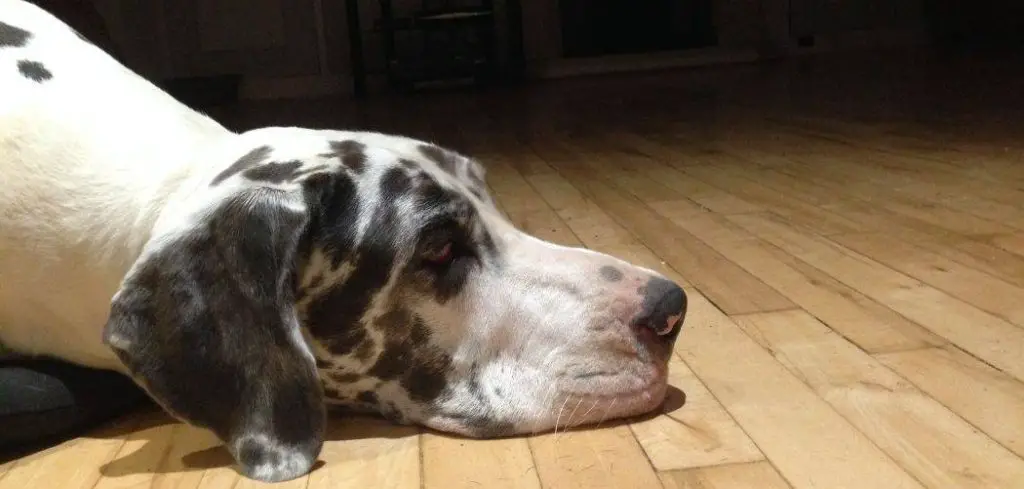When your dog is pacing at night and refusing to eat, it’s more than just a bad day — it could be a sign that something deeper is wrong. This unusual combination of restlessness and loss of appetite is often a signal of physical discomfort, anxiety, or underlying illness.
We outline the common causes of dog restless at night and not eating, what you can do at home, and when to seek veterinary help.
Dog Restless at Night and Not Eating — Why It Happens
Dogs that are restless at night and not eating may be experiencing pain, anxiety, digestive issues, or a systemic illness. Gastrointestinal discomfort, orthopedic pain, or age-related cognitive changes can disrupt sleep and appetite.
Emotional distress like separation anxiety or changes in the environment can also lead to nighttime pacing and food refusal. In other cases, more serious problems such as pancreatitis, kidney issues, or bloat could be at play.

Dog Being Restless at Night and Not Eating: Common Causes
Gastrointestinal Upset
Stomach discomfort, gas, or bloating can make dogs feel uneasy and nauseous, especially at night when digestion slows.
You may notice lip licking, burping, or attempts to vomit without bringing anything up.
The discomfort can lead to restlessness and a refusal to eat, as the dog associates food with further stomach pain.
Pain or Orthopedic Problems
Joint or muscle pain can worsen during rest or inactivity, particularly in senior dogs or those with arthritis.
At night, when there are fewer distractions, the discomfort becomes more noticeable to your dog. This can prevent them from lying still or relaxing and often suppresses appetite as well.
Look for signs like difficulty lying down, limping, or whining when moving.
Read more: Dog Not Eating and Crying at Night (What it could mean)
Anxiety or Environmental Stress
Nighttime anxiety is common in dogs with separation anxiety, noise phobia, or sensitivity to changes in routine.
A restless dog may pace, pant, or bark during the night, especially if left alone or exposed to strange sounds. Appetite loss is also a frequent symptom of stress in dogs.
Triggers may include storms, loud neighbors, or even internal changes like hormonal shifts.
Cognitive Dysfunction Syndrome (Doggy Dementia)
Older dogs suffering from cognitive dysfunction may become disoriented at night.
This often results in restlessness, vocalizing, and disrupted sleep-wake cycles. Appetite changes often follow due to confusion or decreased sensory perception.
Other signs may include staring at walls, getting stuck in corners, or forgetting housetraining.
Pancreatitis or Systemic Illness
Conditions like pancreatitis, kidney disease, or liver problems can cause both restlessness and lack of appetite.
These illnesses can cause internal discomfort, nausea, or pain that flares up in the evening hours.
Symptoms might include vomiting, diarrhea, yellowing of the gums, or increased drinking and urination.
What to Do If Your Dog Is Restless at Night and Not Eating
Start by making your dog comfortable in a quiet, dimly lit area with minimal disruptions. Use calming tools like a pheromone diffuser or a weighted blanket.
Try offering bland, easy-to-digest foods such as boiled chicken and rice to entice your dog to eat.
Ensure your dog has access to fresh water and a clean sleeping area. Monitor for signs of bloating, vomiting, or labored breathing.
If anxiety is suspected, try adjusting their nighttime routine to include calming walks or puzzle feeders earlier in the evening.
Keep a symptom journal noting when restlessness occurs, food refusal patterns, and any other changes.
When to Call or Visit Your Vet
If your dog remains restless for more than two nights and continues to refuse food, it’s time to involve your vet.
Seek urgent help if you notice vomiting, diarrhea, bloated abdomen, pale gums, or signs of pain when touched.
Older dogs with cognitive changes or suspected chronic illness also need evaluation to rule out serious conditions.
Nighttime restlessness paired with appetite loss is not just behavioral — it’s often a medical issue needing attention.
Read more: Dog Not Moving and Not Eating (When to worry and why)
Key Takeaway
When a dog is restless at night and not eating, it’s usually a sign that something is off — physically, mentally, or emotionally.
Look for accompanying symptoms, make your dog comfortable, and don’t hesitate to seek veterinary advice. Trust your instincts: if your dog’s behavior is out of character, it’s always better to be safe and get them checked.
